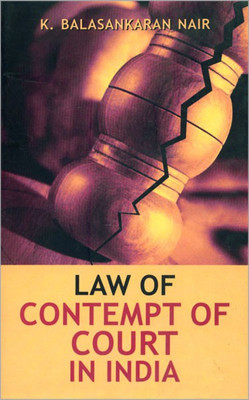Law of Contempt of Court in India 1 Edition(English, Hardcover, Nair K. Balasankaran)
Quick Overview
Product Price Comparison
Contempt of Court, because of its controversial nature, has created contradictory opinions among the jurists as well as scholars. The contempt jurisprudence with the common law origin has been transmitted into the Indian jurisprudence by the Courts of Record through several charters. Our Constitution has acknowledged and accepted this jurisdiction by conferring the status of Court of Record to the Supreme Court and High Courts. A country embedded in the concept of rule of law should give due respect to the law and the organ which applies the law and administers justice. This organ which possesses neither the muscle power nor the money power has to extract due obedience to its orders only through this jurisdiction. But difficulty arises when this jurisdiction clashes with the invaluable rights of citizens as well as those of the Press, as enshrined in the Constitution. It becomes all the more difficult when it interferes with the functioning of administrative authorities, corporations and the like. It poses different questions. What constitutes a contempt of court? When and how this jurisdiction has to be exercised? In what way is the judiciary, one of the organs of the state, justified in controlling other organs of the state and also rights of citizens in the name of contempt jurisdiction? No indepth study has been undertaken so far to ascertain the answer to the above questions. The author has made sincere and humble attempt to cull out answers to the above questions in the light of judicial interpretations. The concept of criminal contempt, which includes prejudicing fair trial or interfering with the administration of justice or scandalising the court, is analysed in relation to the rights of individuals and those of the Press. The concept of civil contempt, which includes disobedience to the orders of the court or breach of an undertaking, is analysed in relation to the administrative authorities and corporations, individuals and subordinate judiciary. The existing political and social scenario requires a comprehensive understanding of this branch of law to eliminate its possible misinterpretation. It is hoped that the observations and suggestions made by the author will be of immense help and of use for students, lawyers, law teachers and administrators.


